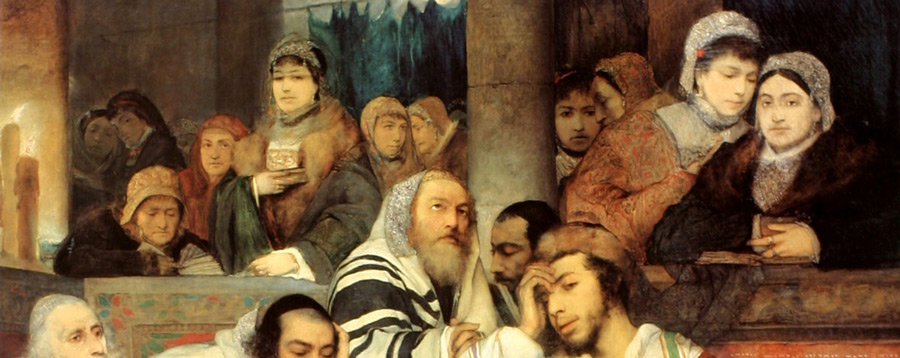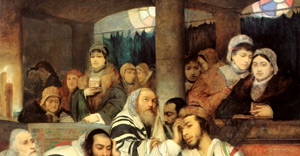I have two Jewish neighbors on my street in the little Yorkshire town of Hebden Bridge. One, who has chosen to have nothing to do with religion of any kind, has a daughter who’s opted to live as an evangelical Christian. The other, a woman in her late thirties and the daughter of good North London Jews, married a man she met at college who was cosmopolitan, intellectual, and sensitive—all the things she considers to be Jewish characteristics. “It’s only when he’s with his parents that I realize he’s not Jewish.” When we moved into the neighborhood, she initially brought her two daughters to our house for Sabbath meals, but as time passed she stopped accepting our invitation. Clearly it was simpler to avoid a shared religious ritual, even over a meal, than to address the questions her daughters were quickly becoming old enough to raise.
So it was a surprise when she asked me to come speak to her students about Jewish tradition. A hospice nurse, she had become a lecturer on end-of-life care and was now teaching a whole course on the subject. What irked her enough to seek me out was the frivolity with which some of her students mocked the need for ritual and symbolic acts in patients who might “still believe in that sort of thing,” as if they were a pygmy tribe. The nursing school is at the University of Bradford, in the middle of Britain’s largest Muslim community, but she was not about to invite an imam, or a Church of England vicar, or a Roman Catholic priest, and she didn’t know any rabbis. But we had talked about end-of-life care and about my interest in using extended interviews or memoir transcription as an alternative therapy for the dying: a way of getting people to review unfinished business or to find a starting point for conversations they might wish to have with their family.
In other words, we’d talked about vidui: the Hebrew term for a form of private or public confession recited quietly as part of daily prayer in some congregations and aloud in all congregations as part of the Yom Kippur service. The daily version, beginning ashamnu, is shorter; something like it appears in the Book of Daniel, “We have sinned, and corrupted, been wicked, and rebelled, even by turning from your commandments and judgments.” The verbs both in it and in the longer version, “Al het,” are in the plural—“we,” not “I”—and both are acrostics, a form that can aid the memory by providing a catalogue of dozens of sins in alphabetical order.
The term vidui recalls the confession that Moses instructs his brother Aaron the High Priest to make during Yom Kippur (Leviticus 16:21) in order to transfer the sins of the people onto a goat that is then sent away into the wilderness. Now the goat is gone, and so is the High Priest; but the sins and the people remain, so the confession endures.
But why should we confess, and particularly on Yom Kippur? The Talmud (Shabbat 32a) says that all who are sentenced to death make a confession. It adds, eloquently (in the minor tractate of Smahot): “Many have confessed but have not died; and many who have not confessed have died. And many who are walking outside in the marketplace confess. By the merit of your confession, you shall live.” And this is the phrasing that Joseph Karo in the 16th century codified into law in his Shulhan Arukh, turning a recommendation into a requirement.
But again: what is so important about confessing? And why in public? And why through these prescribed formulas? Surely nobody ever committed quite so many sins as these, or sinned in so ornate a manner as to require such a minuet of expiation.
Yom Kippur entails acknowledging a list of sins you may not personally have committed. The point of the recitation is in the collective, which serves two functions. The first is that by acknowledging yourself to be in the collective, by shouldering a communal burden, you are confessing everything: not just what you are willing to confess to but also what you are not willing to confess, sins you committed knowingly and sins you committed unknowingly, sins that you were barely aware of. You are acknowledging that you have done it all, and if you haven’t yet done it all you might do it all, and even if you might not, you are hopeful in any case of forgiveness. It’s a letting-go of everything, the stains you can see and the ones you cannot. You want to be clean.
The second function of the collective is to replace the service of the High Priest and his transference of the collective’s sins onto a goat. The community standing together is a testament to your personal seriousness of purpose. In a sense, you are putting your own fate in the hands of all the people around you. Like Abraham haggling with the Almighty before the destruction of Sodom, you are asking whether He would really destroy all this great congregation if there turned out to be fewer righteous individuals than He’d expected to find here. By reciting all possible sins as part of your own account, you are drawing about yourself the merit of all those present. You are saying to the Almighty not only what you are—the catalogue of sins, of which you have committed at least one or two—but also who you hope to be: a part of this group you choose to stand with and that contains (again, a hope) some righteous souls. You hope that it’s not goats but, as Martin Luther King, Jr. put it, the content of our character that is the deciding factor as we face the Almighty.
So I went with my neighbor, who will not be attending the Yom Kippur service, to the school of nursing where she works, and into an auditorium of 120 student nurses, male and female. I asked for a show of hands to get a sense of what traditions the audience would be slotting vidui into. There were a couple of Pakistani Muslims in the front row, a few Catholics dotted about, one or two Protestants, and the rest were the great wash of English post-believers. It used to be said that the Church of England is what the British had instead of religion. They largely do not have even that anymore.
That was why I was there. My post-religious neighbor may not observe much in the way of Jewish practice herself, but she takes the dying seriously, and while she didn’t trust herself enough to pound the message into her students’ heads, she was expecting me to dent their disdain toward the remnants of a generation that did still practice. I was supposed to make them feel more sympathetic to the flotsam and jetsam left on the beach after the tide of belief in God went out.
I didn’t pound Torah into them. Among the various high and low roads across the terrain of faith, I chose one of each. Taking a high road, I first presented the vidui as a simple legal requirement, like last rites for Catholics. You have to say it, or, if you aren’t capable of saying it, have someone say it for you. Simple; cut and dried. I recited a few lines in Hebrew to give them a sense of the music of it, and then read the English text to give them a sense of the swath of sins covered, the intricate span of corruption. I think that may have impressed even the committed atheists.
And then I took the low, humanist road and pitched straight for the soft underbelly of my unbelieving crowd: guilt, and fear. I told them about my idea of interviewing the terminally ill and editing their autobiographical accounts into books that they could give to their (soon to be) survivors and perhaps use as conversation-openers before it was too late to set anything right. I said we all need to get the story of our life straight before we die, there’s nobody who doesn’t benefit from looking over what they hoped to have done and what they actually did, what they could have done and should have done, what they need to make right in order to let go, and to be let go of in turn. For the most part, I think they bought it. The low road was something even the most religion-phobic could not balk at. I got a round of applause; my neighbor said, “I knew you could teach”; and the students went out buzzing away among themselves.
My neighbor’s husband called me the following week, fulminating because four of the 120 students had complained, anonymously of course, that if they were going to have a representative of a religion speak to them, it should have been from one of the religions they were likely to encounter in their nursing wards. He thought the complaint was anti-Semitic, but I didn’t take it that way. I’m pretty sure it wasn’t the Muslims who complained, or the Catholics, or even the Protestants. They seemed both to be engaged with what I said about the vidui and not to object to my humanist idea of a memoir.
No, I suspect the few complaints came out of the larger mass of post-believers, the ones who are happy to take up nursing but don’t like to think that dying is something that might happen to them, or that the people who will be dying on their watch are actually like them—are people. I think the four complainants were complaining not because they wanted a Church of England vicar but because I raised the spectre of their own death, and not only that but the spectre of their loneliness dying alone in a hospital with no way to re-establish the connection to whatever relationships remained unresolved as they approached their end. So I took their protest as a compliment. I took it that my case for the prosecution—or was it for the defense?—had rattled them.
A few lines of the Al het, the Yom Kippur vidui, to close. I’ve chosen these because they leaped out at me for being rooted in the body and not the mind:
For a sin we sinned before you in breaking bounds
And for a sin we sinned before you in argument.
For a sin we sinned before you with intent against a friend
And for a sin we sinned before you with a narrow mind.
For a sin we sinned before you being feather brained
And for a sin we sinned before you being stiff necked.
For a sin we sinned before you being swift of foot to do wrong
And for a sin we sinned before you with a slanderous tongue.
For a sin we sinned before you with an empty vow
And a sin we sinned before you with a baseless hate.
There is no tune for this prayer; it’s as long as your guilt and as flat as the desert. But when I think of the last synagogue I spent Yom Kippur in, a tiny shtiebel in Leeds, the sound track in my head for this time of year is the closing passage of Avinu malkeinu, another recitation of sinfulness and entreaty for forgiveness, sung with particular longing only on the Days of Awe and other public fast days. It climaxes:
Our Father our King
Pardon and answer us
Because we have no deeds
Deal with us in charity and kindness
And deliver us.
At the end of the day, we ask the Almighty to treat us as we should have treated our fellows, hoping He will do better than we did.
More about: High Holidays, Jewish ritual, Religion, Yom Kippur








